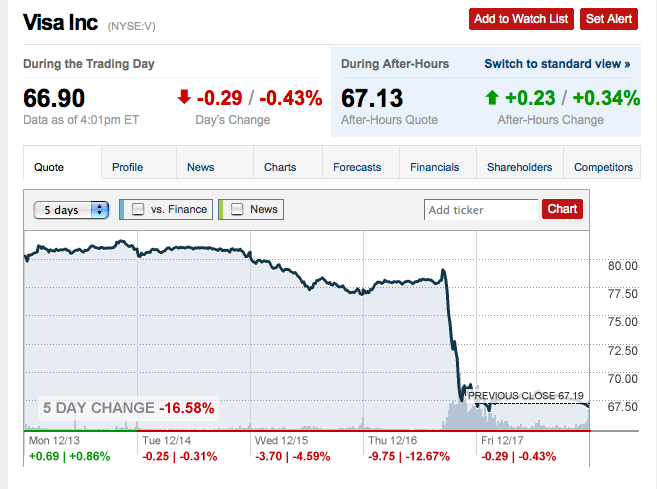Uncategorized
What The Heck Happened to the Merchant Processing Resource?
August 26, 2011WHAT THE HECK HAPPENED TO THE MERCHANT PROCESSING RESOURCE?
We’ve had a lot of design changes implemented to our site in the last year. We hope this is the last one. Thank you for your patience!
Bottom line: Our previous web host sucked (Webs.com). Their dns servers were always down late at night and on weekends for “maintenance.” Their site building tools would crash 90% of the time and their technology is so old that it was impossible to do pretty much anything other than post a blog.
So we found new hosting and prepared ourselves to move the site in its original format but Webs.com disabled our access to FTP, making it impossible to retrieve our files. It appears they did this to discourage us from leaving them. That was the last straw.
So without FTP access, we were stuck with figuring out how to move thousands and thousands of pages. Not to mention, we figured out that Webs was hosting many files remotely, so we wouldn’t have been able to access most of our content anyway.
We got creative and reverted back to primitive programming on the OS X unix terminal, using curl –O commands against our sitemap to download our site through http into individual files.
So now we have the raw data, but the CSS stylesheets are gone. That means the pages are up but they’re styled like it’s 1994. Ugly, ugly, ugly.
In the next week (that’s what we say but it will probably take longer), we intend to repost that content into our wordpress theme. The old files will probably be given a 301 redirect to prevent ’404 File not found’ errors for indexed urls.
deBanked has big plans for the rest of 2011 and 2012, especially with the amount of traffic we were getting while using the old, useless format.
In the meantime, you can forward all questions to webmaster@merchantprocessingresource.com
——–
Update 8/24 All old articles have been republished to the site in a readable format. Their dates/timestamps are still wrong but the original urls are intact.
Did Somebody Say the End of the Credit Card Industry?
August 23, 2011
We check our site’s inbox once a day and usually receive some compliments, feedback, or industry secrets. But over the last two days, more than 15 people e-mailed us this link: The End of Credit Cards is Coming. This was followed by a barrage of comments such as “Does this mean the end of the Merchant Cash Advance industry as well?” or “It looks like your site topics are going to be obsolete.”
If any industry is poised to take a hit as a result of this “payment evolution”, it’s likely to be the manufacturers of plastic and magnetic strips. (The companies that make the cool shiny holograms on the back may also suffer.) If you actually READ through the article, it discusses an industry progression towards contactless payments. A contactless payment is still an electronic payment and it involves the same networks and banks. Saying the declined use of physical rectangular plastic cards will result in the end of the electronic payments industry as whole is like saying that the less frequent use of flutes and banjos will result in the end of music.
All sarcasm aside, this progression towards contactless payments indicates the merchant processing industry is on the verge of an explosive rebirth. Here’s why:
Equipment Sales and Leases
New technology to accept contactless payments will be required. If plastic cards are slowly phased out, retailers will have absolutely no choice but to purchase or lease equipment to accept contactless payments. (Sales and Leasing boom)
Increased Interchange profits for banks
The growth of contactless payments will likely cause Visa and MasterCard to increase certain interchange categories. They will rationalize this by providing proof that contactless security costs more.
New Payment Networks
Every merchant needs to accept both Visa and MasterCard branded cards in order to survive. In some regions of the country, it’s also important to accept American Express. Though American Express charges merchants more, they can’t afford not to have it. That being said, the above referenced article mentions the formation of a new super power payment network called ISIS to rival the current players. ISIS was formed by AT&T, T-Mobile, Verizon, Discover and Barclays Bank. Since ISIS is indepedent from the other payment networks, they will be able to create their own “interchange” and cost structure. I am inclined to believe that costs will not be lower than what’s commonplace in the current marketplace.
Increased Electronic Payments Usage
For the past 4 years, we’ve been lectured repeatedly by the government, teachers, and financial experts that credit cards are bad. During that same time period, we’ve also celebrated the importance and efficiency that phones/smart phones have brought into our lives. Blackberries, iPhones, Droids, texting, apps, skype, and wireless internet are the bread and butter of our daily lives. So what is the public inclined to infer with phones capable of making electronic payments?
- Credit Cards Payments Bad
- Smart Phone Payments Good
As long as Smart Phone is Good, consumers don’t need to feel guilty over their usage of credit. I’m sure we’ve all seen the debt counseling talk shows where they take an out of control spending housewife and force her to cut up her credit cards. She cries a little, acknowledges her problem, and then in a symbolic gesture of triumph, cuts up her cards. The entire charade portrays the plastic card as the perpetrator of the woman’s debt problems. One thing I don’t expect to see any time soon is a woman being lectured by a debt counselor to smash her iPhone with a hammer to stop her out of control spending. “In order to conquer your debt, I want you to go home and burn all 5 of the Droids on your family plan.”
BECOME DEBT FREE
Join the thousands of people who are breaking their scissors on their phones, buying new scissors, and then smashing their phones with a hammer. Say “Forget it to Credit” because there’s no app for your spending problems!

Those rectangular plastic cards may be on their way out but contactless payments are going to bring billions to the merchant processing industry. Happy processing!
-deBanked


 People come to me for advice on business lending quite often. I’ve spent years helping small business owners obtain financing, many of whom were turned down previously by a bank. And so the story has been told that if traditional lending doesn’t seem to be an option, there is an excellent Plan B, Merchant Cash Advance (MCA). The characteristics of an MCA have
People come to me for advice on business lending quite often. I’ve spent years helping small business owners obtain financing, many of whom were turned down previously by a bank. And so the story has been told that if traditional lending doesn’t seem to be an option, there is an excellent Plan B, Merchant Cash Advance (MCA). The characteristics of an MCA have 
 Karlene Sinclair-Robinson, dubbed “The Queen of Business Financing” is the Bestselling Author of
Karlene Sinclair-Robinson, dubbed “The Queen of Business Financing” is the Bestselling Author of  I’ve worked in the alternative business lending industry for quite a while and I’ve noticed something off about many of the marketing campaigns. Some lenders have gotten so caught up in the funding that they’re losing sight of what it’s like to run a small business. Admit it, we’re all a little rusty even if we were once small business owners ourselves.
I’ve worked in the alternative business lending industry for quite a while and I’ve noticed something off about many of the marketing campaigns. Some lenders have gotten so caught up in the funding that they’re losing sight of what it’s like to run a small business. Admit it, we’re all a little rusty even if we were once small business owners ourselves.



























